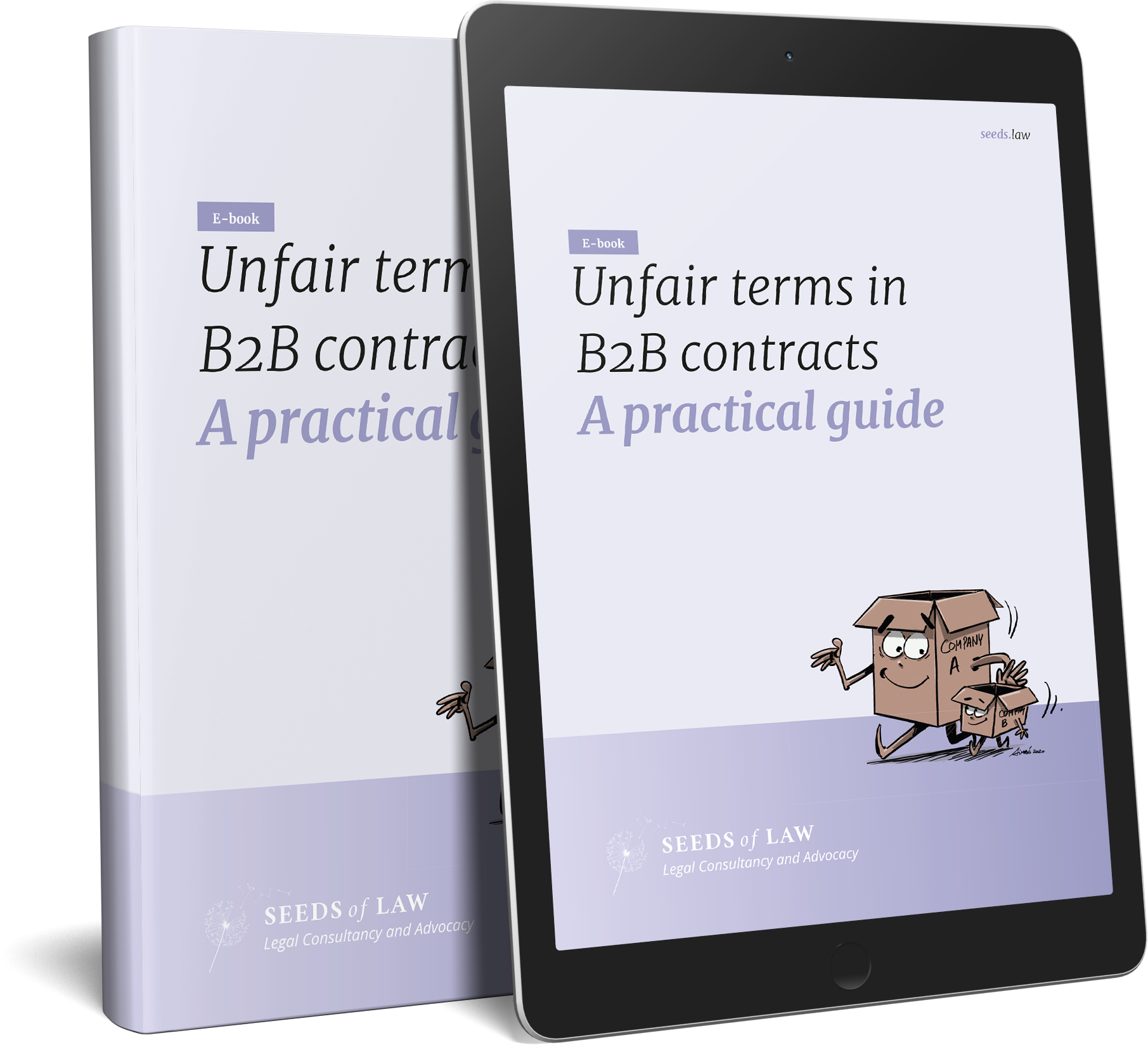- Commercial and Economic Law
- Steve Griess
- B2B , B2B-legislation , B2B-contracts , Unfair contract terms , Unfair terms , weaker party , manifest imbalance
1 December 2020 marks a major turning point for business-to-business contracts (B2B), as that is the date on which the law prohibiting unfair contract terms will enter into force.
Over the last few months, our team has been working on a practical guide to help businesses through the maze of new principles that are often very hazy.
1. What are these new principles?
The legislator has decided to apply to business-to-business (B2B) contracts, principles similar to those that have already existed for years in business-to-consumer (B2C) agreements, and to punish certain contract terms deemed unfair for the "weaker" party.
The law therefore establishes the general principle, in B2B relations, that contract terms creating a manifest imbalance in a contract between professionals are unfair and should be declared null and void.
To this end, the new legislation introduces two lists of terms, prohibited in any event, on the one hand, and presumed to be unfair, on the other.
1.1 Prohibited terms, known as "black" terms, are terms by which :
- a weaker party is bound by commitments, while the other party is completely free to withdraw from its own commitments;
- a party reserves the right to interpret the concluded contract on its own;
- a party waives in advance any right of recourse against the other party;
- a party is considered to have adhered to terms and conditions of which it did not have the opportunity to consult before the conclusion of the contract.
1.2 Terms which are presumed to be unfair, but for which evidence can be submitted to prove the contrary, known as "grey" terms, are those terms which:
- allow a party to unilaterally modify the price and conditions of the contract without valid reason;
- allow one company to wave from its liability, its wilful misconduct (fraud) or even its serious fault;
- bind the parties without a reasonable notice period to terminate the contract;
- allow a contract to be renewed without providing for the possibility of opposing to this renewal or without granting a reasonable notice period to terminate the contract;
- limit the means of proof that can be provided by a party;
- set excessive penalty clauses;
- impose commercial risks on one party while, depending on the economic sector concerned, they must be borne by the other party.
These lists are not exhaustive. In practice, each contract term may be found to be unfair if, on its own or in combination with one or more other terms, it creates a manifest imbalance between the rights and obligations of the parties.

2. Why is this law likely to cause practical difficulties?
Because this law contains many vague or variable concepts, which consequently leads to a certain unpredictability.
The above list can already show example, since it states that certain contract terms are presumed to be unfair if they are formulated "without a valid reason" or have to be assessed "in relation to the economic sector concerned".
To make matters even more complicated, in order to assess the potential unfairness of certain terms, Courts are asked to take into account the following principles:
- the circumstances in which the contract was concluded;
- the general economy of the contract;
- the commercial practices in force in the sector concerned;
- the other terms of the contract;
- the nature of the products covered by the agreement.
These lists and terms may be subject to varying interpretations. That is why it is essential to anticipate risks through a case-by-case review.
False Read alsoDiscover our e-book about unfair terms in B2B contracts
In our e-book “Unfair terms in B2B contracts” you will discover a number of interesting tips to familiarize yourself with the new principles of the B2B law.

3. What is our proposal to find your way in this?
Starting from the theoretical principles of the law, we have made a study of the various situations and particular contracts that are common in economic life.
This guide will be published in several consecutive articles and gives you the opportunity to update and read on a lot of aspects of the B2B law on our website. Our articles will also be available in a specific folder on our home page under the title "Unfair terms in B2B contracts - A practical guide".
This practical guide will guide you, in a synthetic and accessible way, through the following topics:
- Which contracts are subject to the B2B law?
- What changes do I need to make to my general terms and conditions?
- The pitfalls of the B2B law for service and distribution contracts.
- Does the B2B law call into question the basic principles of franchise contracts?
- Which classic clauses of commercial renting and construction contracts will have to be modified?
- The consequences of the B2B law for company law
- The consequences of the B2B law for insurance contracts.
Enjoy reading and for any further questions ... our Seeds of Law specialists are available to inform or assist you. Please contact them via info@seeds.law.
Read also



